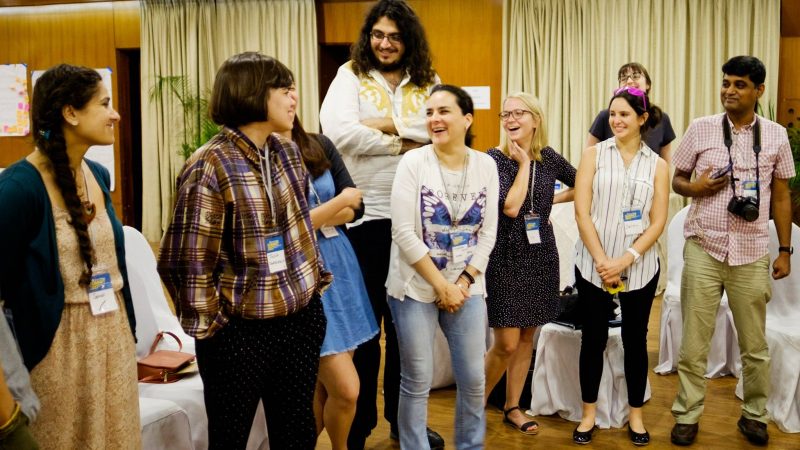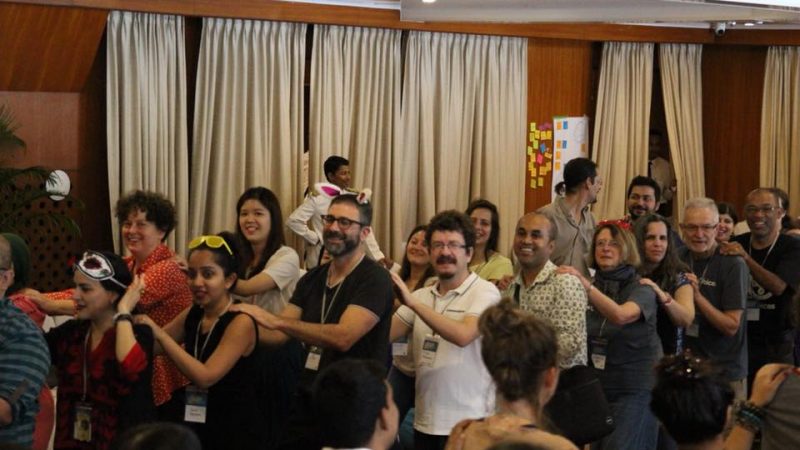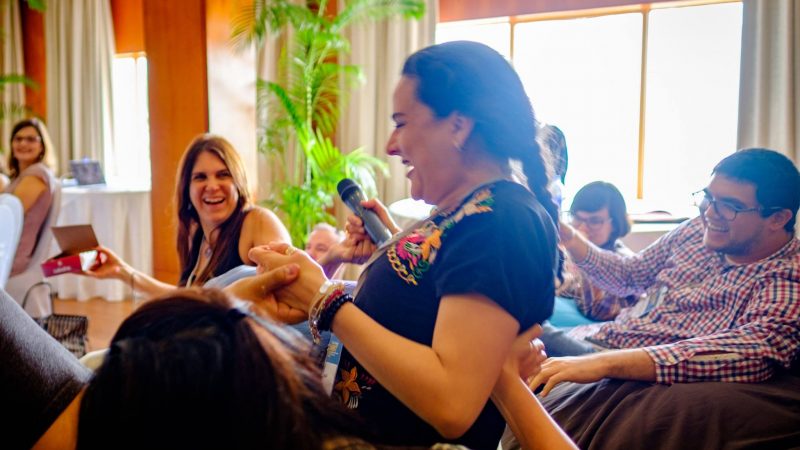
GV editors and staff at the Global Voices Staff Meeting in Colombo, Sri Lanka, on November 28, 2017. Photo by Jer Clarke. CC-BY-NC.
This post is part of series of reports on newsroom activities at the Global Voices Community Meeting in Colombo, Sri Lanka on Nov 28-Dec 1, 2017.
A day before the meetings with the full group of 130 community members started in Colombo, Global Voices newsroom editors and staff members got together for a day of reflections and brainstorming on our future.
In the previous post, we gave an overview of some of the identity and mission-related brainstorms [1] the newsroom led at the staff meeting.
In this post, we’ll talk about some of the support and community-related exercises we led. Many of the conversations dug into how Global Voices has evolved organically over the years into a “learning organization”, and the role of mentoring in such an environment.
To recap: in June 2017, we asked our newsroom editors to share what they wanted to achieve at an in-person newsroom editors meeting. Here’s what they said about community, support and team building:
- We need to get to know each other and build stronger ties! I'd be great if we could spend a whole day in a team building activity (this, for me, is the most urgent and important matter)
- I feel the editorial team is still a dispersed “team”, we may know each other by name but that's about it.
- More interpersonal communication, share each other’s work, difficulties we face etc and innovation in our work.
- How can I have more balance between meeting my weekly targets and publishing long posts that are well-researched?
- Ways to engage the community (would like to hear how editors from other regions do this)
- Goodness, hardships and learnings of editing for GV.
- Self-care and how to not go insane.
- How to empower our authors, make them better writers, keep them motivated and also safe
- How can we build a community that is safe and committed to our mission?

GV Community members form a conga line at the Global Voices Community Meeting in Colombo, Sri Lanka by Raphael Tsavkko Garcia. CC-BY-NC.
How are we different online versus IRL?
Although the line between online and in real life is becoming ever blurrier, it is clear that there are still significant differences between how we present ourselves or how we are perceived online, compared with in real life. Different aspects of ourselves are given different levels of emphasis depending on the space.
One of the first conversations we had among newsroom editors and other section leaders in Colombo was comparing how we would describe our real-life selves in three words to the online persona we have in three words. Some editors had no overlaps! Key aspects of their real life were kept private for privacy or safety reasons. And for others, there were aspects of their online activism that friends and family in their real life did not know about.
The point of this exercise was to get to know each other and have conversations about the various complex identities and realities we bring to the table as editors. We touched upon self-care as well, a topic into which we’ll dive deeper in a post about a workshop the newsroom led at the community meeting.
“Editing is necessary, but so is mentoring.”
We also had some community-related conversations in the opinion spectrometer exercise [2] that we mentioned in the previous post. Here are some of the conclusions we drew:
- Many times authors want feedback and want to grow as writers, instead of a transactional publication relationship, which requires being more of a mentor than an editor. It can also help authors grow if they are mentored.
- Editing is necessary, but so is mentoring. You have to follow the process of a story all the way through; publication isn’t the end of the relationship, nor is writing the story the beginning.
- We are mentors more than we are editors.
- Editors who started out as authors themselves in the GV community say their regional editor was very much a mentor, not just an editor.
- The regional editor-author relationship is personal.
- It might just be a difference in understanding of the word “editor,” but in some news environments the “editor” is also a mentor by default; it’s part of the job description.
- Part of GV is giving authors a structure to be journalists.
In community building, there is no one-size-fits-all solution
Later on, we teamed up with our Translation Managers and discussed some common challenges we face in building and nurturing community at a Global Voices. Here are detailed notes on that session [3].
The main takeaways were that recruiting and retaining volunteers is something all sections struggle with. We agreed that there’s no one-size-fits-all solution, so trying out many different strategies to build community is best; many editors thought the ideal would be to pay contributors. Group discussions yielded the following possible solutions:
- Motivate contributors with popular views newsletters
- Offer a certificate for translators and authors in lieu of pay
- Offer prestige of some kind, like letters of recommendation
- Target recruitment efforts at academics who already like to write and think deeply or people who share GV value and demonstrate that in their other work
- Promote the translation of articles to potential writers as a hook for why they should write
- Make the existence of communication channels clear, or reduce the number of them. Help people find the appropriate venue to participate and communicate, because a virtual community can be daunting
- Get existing members to share resources with new contributors or generally guide their entry into the community
- Publicize all these things we do and offer for community
- Direct messaging is more useful sometimes than group messaging
- Evaluate if the investment of time in a particular volunteer is worth it
- Highlight ways that their story/translation is making a difference or having an impact
- Tailor the application form to all of our different languages
 [4]
[4]GV Community members at the Global Voices Community Meeting in Colombo, Sri Lanka by Jer Clarke, CC-BY-NC.
In conclusion, we decided that we need to be more intentional with our efforts to recruit and retain and be effective guides for new contributors who are just entering into the community. We should give them examples of ways can they participate beyond the activity that drew them to GV (writing or translating or researching), orient them towards the appropriate communication channels, and perhaps set up a peer-to-peer mentoring system to help guide new contributors.
We also decided we need to communicate much more clearly with the community and with external audiences about the benefits of contributing to GV: that your work will be published, could be translated, your resume could get a boost, the possibility of letters of recommendations and certificates, and membership in a unique like-minded community with a global network of connections.
Here are the previous two posts in this series: